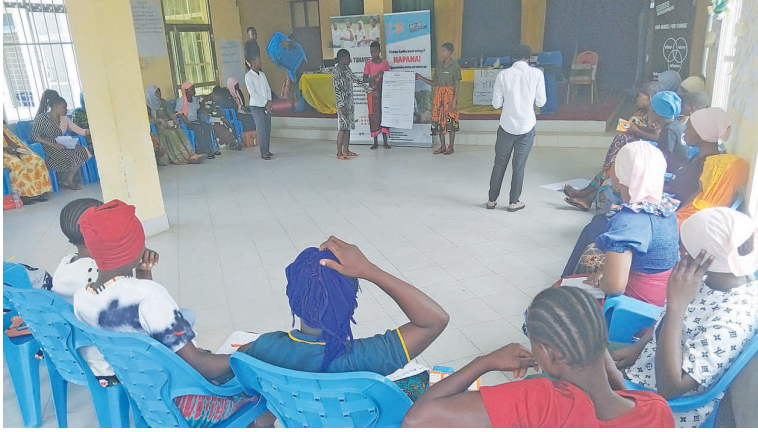Why investing in economic empowerment programmes for young mothers matters

FOR 24-year-old Hawa Peter, a resident of Bahi Sokoni in Bahi District, Dodoma Region, the idea of living a comfortable life once felt out of reach.
Her dreams were cut short in Standard 7 when she became pregnant at just 16. With no other option, she dropped out of school, her aspirations seemingly erased overnight.
Stigmatised by both her family and peers, Hawa’s life spiralled into hardship, forcing her into risky and unstable means of survival.
Hawa’s story mirrors that of Sophia Michael, who also became a young mother at 17. Recounting her experience in an interview with the Sunday News, Sophia revealed how her parents disowned her, branding her a “curse” and evicting her from the family home.
Hawa and Sophia represent a significant number of adolescent girls in Bahi District who see their futures diminish after becoming firsttime young mothers.
According to data from the Bahi District Council, while over 90 per cent of girls are enrolled in primary school, only about 20 per cent proceed to secondary education. Many drop out due to early pregnancies, leading to a cycle of poverty, missed opportunities and, in many cases, child marriages.
Nearly half of the married girls and young women aged 15 to 24 in Bahi are wed before reaching the legal age of 18.
This trend is not unique to Bahi. Findings from the 2022 Tanzania Demographic and Health Survey and Malaria Indicator Survey (TDH-MIS) highlight a widespread prevalence of teenage pregnancy in Tanzania, especially among girls from the poorest households.
Older teenagers (18–19 years) are particularly at risk, largely due to limited access to contraceptives and sexual health education.
To address these challenges, Restless Development Tanzania, a youth-led organisation based in Dar es Salaam, has partnered with CRDB Bank, Mulika Tanzania and the United Nations Population Fund (UNFPA) to implement a youth empowerment initiative in Dodoma Region.
This programme, according to Ridhione Juma, Programmes Manager at Restless Development Tanzania, targets vulnerable youth, including first-time mothers, young people living with HIV and youth with disabilities.
“The aim is to equip them with leadership, entrepreneurship and life skills while addressing financial illiteracy and the lack of access to sexual and reproductive health and rights (SRHR) education,” Juma explains.
The initiative operates in Bahi, Chamwino, Kondoa and Dodoma City Council. It is closely linked with the Safeguard Young People (SYP) programme, a flagship UNFPA initiative across East and Southern Africa.
Launched in 2019, SYP supports adolescents and youth aged 10 to 24 in protecting themselves from sexually transmitted infections, early and unintended pregnancies, unsafe abortions, early marriages, gender-based violence and other harmful practices.
From an initial cohort of 20 participants in 2019, the programme has grown significantly. By 2023/24, it aims to reach 280 young people across Dodoma.
Hawa and Sophia are among its success stories. After graduating from the programme, Hawa took out a loan and started a juice business, “The Juice Point,” which has now grown into a thriving restaurant.
“Today, I supply catering services across the district. My business can cater for up to 500 people at a time and I earn between 1.5m/- to 2m/- monthly,” she shares proudly. She now employs two people. Sophia, too, has turned her life around. She now runs her own tailoring business.
“I was hopeless after my pregnancy. Thanks to the programme, I am now a proud business owner and a happy mother,” she says. The Sunday News also visited a training session in Bahi District, where young mothers were engaged in group discussions and SRHR education.
The atmosphere was one of optimism. “Thanks to the training, I now understand how to protect myself. I’m confident I won’t face another unplanned pregnancy,” says 22-year-old Nasra Mfaume, who became a mother at 19. Her sentiments are echoed by Neema Mayombe, also 22, who had her child at 18.
“The sessions are empowering. I finally feel in control of my life.” Tanzania, a member of the Southern African Development Community (SADC), has one of the fastest-growing economies and a youthful population, over 50 per cent of its 61.7 million citizens are under 25.
While the government has invested heavily in youth development and healthcare, challenges persist, especially in SRHR education, economic access and informed decision-making among adolescents. Teenage pregnancy remains high at 22 per cent and comprehensive HIV prevention knowledge is still below 50 per cent for both men and women.
Only onethird of adolescent girls can make informed decisions about their reproductive health and unmet need for family planning among this group remains above 22 per cent.
According to Amina Mafita, a Health and Social Welfare Officer in Dodoma, economic empowerment must go hand in hand with SRHR education.
“When youth, especially girls, are financially independent, they are more likely to access and use health services, including contraception.
This is crucial in reducing poverty and advancing gender equality.” On April 18, 2024, the SYP programme was officially launched in Tanzania by Deputy Minister of State in the Prime Minister’s Office for Labour, Youth, Employment and Persons with Disabilities, Patrobas Katambi. During the event in Dar es Salaam, Katambi emphasised: “The SYP Programme is aligned with our National Agenda.
I urge all stakeholders to ensure its implementation supports Vision 2025 and national development goals.”


